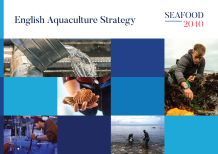Articles

English Aquaculture Strategy Seafood 2040
SAF research informs new Aquaculture Strategy for England
Researchers from the Centre for Sustainable Aquaculture Futures, SWEEP and the Renewable Energies Department (Penryn) at the University of Exeter have contributed to the recently released English Aquaculture Strategy.
Published on 26 November 2020, the English Aquaculture Strategy sets out a vision and plan for the sustainable development of English aquaculture over the next 20 years. This plan supports a ten-fold increase in production from farmed finfish, shellfish and seaweed, to approximately 90,000 tonnes*, by 2040. The comprehensive strategy developed by Poseidon Aquatic Resource Management Ltd and supported by Seafish and the Defra SeaFood 2040 Strategic Framework, seeks to aid the sector in its efforts to increase its contribution to England’s food security, seafood consumption, and job growth.
*Production targets for 2040 (compared to 2020 baseline): Finfish 40,900 tonnes (+550% from 6,290 tonnes); Shellfish 37,300 tonnes (+966% from 3,500 tonnes); Seaweed 13,000 tonnes (+260000% from ~5 tonnes).
SAF researchers have been working in partnership with numerous experts from the fields of marine planning, science and industry to streamline regulatory processes and clarify evidence requirements in order to inform the new strategy.
The research, which was funded by NERC and Research England’s Strategic Priorities Fund, fell broadly into two areas; the licencing of emerging marine aquaculture (mariculture) developments in order to support sustainable approaches to shellfish and seaweed farming, and the planning of mariculture developments (particularly those around Marine Protected Areas (MPAs)) to optimise sustainable management of marine resources. Key findings from both areas of work were captured in published policy briefs (https://www.exeter.ac.uk/research/saf/projects/strategypolicyregulation/), and have been incorporated into the English Aquaculture Strategy.
Neil Auchterlonie, SF2040 Chair, said: “The English Aquaculture Strategy is a vital component of the delivery of SF2040, and the opportunities and importance for this piece of work cannot be overstated. We look forward to the delivery of a piece of work that will help to provide a pathway for the growth of this sector in England over the next 20 years, based on the SF2040 foundations of collaboration, science and best practice.”
Dr. Ross Brown, SWEEP Impact Fellow and contributor on both areas of research, said:
“Done in the right way, in the right locations, seaweed and shellfish farming are among the most sustainable forms of food production. We reviewed available evidence and tools for determining whether on balance these forms of marine aquaculture conflict with or complement other uses of marine resources, including fisheries and marine protected areas. I’m delighted to say that our findings have been captured in the forthcoming English Aquaculture Strategy”
Prof. Charles Tyler, Co-Director of the Collaborative Centre for Sustainable Aquaculture Futures (SAF) and PI for the SWEEP aquaculture project, said:
“On the face of it developing aquaculture within MPAs might seem a strange thing to suggest, but the fact is that some forms of low trophic species aquaculture appropriately managed may benefit biodiversity and provide ecosystems services such as improvements to water quality. As the pressure on marine space gets ever greater it makes sense to see where space can be shared for the benefit of both wildlife and people. Any such developments however need to be underpinned with high quality data as we must ensure that our marine environments are not subject to further degradation.”
A full report on the strategy, a summary document highlighting growth opportunities and plans for delivery, and a brief overview of key strategic principles and objectives are available to download from the Seafish website.
Details on the SF2040 programme can be found here.
Date: 3 December 2020
